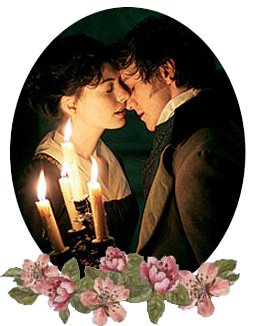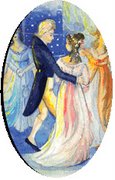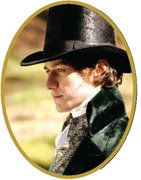 Many many thanks to Maria from Sweden for translating this article, originally written by Petter Karlsson; petter.karlsson@expressen.se. The article is found here. Herewith I also invite more of you to send me more articles… while we wait for Team Jane to compose some very interesting news.
Many many thanks to Maria from Sweden for translating this article, originally written by Petter Karlsson; petter.karlsson@expressen.se. The article is found here. Herewith I also invite more of you to send me more articles… while we wait for Team Jane to compose some very interesting news.
Miss Terrified of Love
At the age of 26 she accepted a proposal from a wealthy youngster. But she changed her mind the very next day. Jane Austen loved love – and was terribly scared of it.
“…he has but one fault, which time will, I trust, entirely remove — it is that his morning coat is a great deal too light.”. Typically Jane Austen. In her whole life she wrote about heated love meetings, passion and sex in secrecy, but she probably only experienced one real relationship. And then… Yes, then she couldn’t help herself but to in a letter to a friend express an irritation over the boyfriend’s too light dressing gown. Maybe she was even afraid of her favourite subejct love? There is much that indicates that.
It feels like Jane Austen wrote the life she wanted to live. Privately, on the other hand, she remained a rather anxious spinster who only dared show her products to the closest family and never really let any man into her life. The only exception was a proposal from a six years younger “big and awkward” man named Harry Bigg-Wither which she first accepted – only to withdraw the answer the next day. And then he with the morning coat, a certain Tom Lefroy that is, later Chief Justice of Ireland, who she had a short fling with as a 20 year old. Reverend George Austen’s oldest daughter was brought up to clear-sight and a fierce irony that was not too common for women in 18th century’s England.
To call her feminist is both right and wrong. Jane Austen never impelled any outspoken thesis. She never protested against that it was the four sons of the family that got the expensive education. (Two became clergymen, two naval officers.) Steady she stood anchored with both boots in a world that was about as liberal as Margaret Thatcher’s politics. Sat right. Curtseyed right. Spoke right. Wrote right. But only just almost. Jane Austen had the ability to look straight through all fancy cravats, graceful phrases and stale conventions. Maybe that is why she still touches us today. The18th century England is not totally unlike the 21st century Sweden. What went on in the finer lounges was sort of a Big-Brother-Soap. Between The Beautiful People a cockfight went on where the most important things were fame and a cool façade. Shallowness meant everything. Profoundness, nothing.
Jane Austen became both a blind follower and revolutionary. She was both fascinated by that world and mocked it. Not everybody appreciated her loving social scourge. Always so sarcastic Mark Twain wrote: “… any library is a good library that does not contain a volume by Jane Austen. Even if it contains no other book.”
Pride and Prejudice. 1797 (published 1813)
Mrs. Bennet at Longbourn in the south of England is struggling to get her five daughters married. The beautiful Elizabeth is enchanted by a young officer, but is at the same time drawn to the proud and arrogant Mr. Darcy.
Trivia
The modern best seller Bridget Jones’s Diary is thought to be a wink to Pride and Prejudice. The male hero is in both cases named Mr. Darcy. When the novels last became film and BBC-series the male leading role is in both cases played by Colin Firth.
Facts about Jane Austen
Lived between: 1775-1817. Died probably of those day’s common illness tuberculosis, or possibly – as her biographer Carol Shields wants to uphold – in breast cancer.
Family: Unmarried.
Residence: Moved around in southern England, Oxford, amongst others Reading, Bath and Southampton. The Chawton cottage is now a museum.
Personality: Witty, ironic, well-read, outspoken, ambitious.
Preferred topics: marriage and love in England’s upper class during the 18th century.
Novels by choice (publishing year): Sense and Sensibility (1811), Pride and Prejudice (1813), Mansfield Park (1814), Emma (1816), Northanger Abbey (1818), Persuasion (1818)
Pic: Cover to 'Pride & Prejudice', Wordsworth edition
 Many many thanks to Maria from
Many many thanks to Maria from 











































2 comments:
Aw! I'm so proud of myself! :)
Oh, you should be! Thanks a lot, mate!
Post a Comment